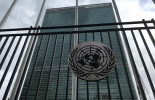 Ось, що ваш кіт справді думає про вас: ви будете здивовані
Ось, що ваш кіт справді думає про вас: ви будете здивовані
 У Лондоні сказали, чи має Україна право бити британською зброєю по території РФ
У Лондоні сказали, чи має Україна право бити британською зброєю по території РФ
 "Чоловіки 30+, реалізовані": Анна Трінчер розповіла про побачення після розлучення
"Чоловіки 30+, реалізовані": Анна Трінчер розповіла про побачення після розлучення
 Влада двох пострадянських країн рекомендувала громадянам відмовитися від візитів до РФ
Влада двох пострадянських країн рекомендувала громадянам відмовитися від візитів до РФ
 РФ замінює західні компоненти в ракетах на власні: аналітики вказали на важливий нюанс
РФ замінює західні компоненти в ракетах на власні: аналітики вказали на важливий нюанс
 Таліби хочуть заманити більше туристів до Афганістану
Таліби хочуть заманити більше туристів до Афганістану
 ISW: Путін "засвітився" із соратником Пригожина, щоб покарати Шойгу за провали в Україні
ISW: Путін "засвітився" із соратником Пригожина, щоб покарати Шойгу за провали в Україні
 Після чуток про побиття: Камалія несподівано поїхала з України
Після чуток про побиття: Камалія несподівано поїхала з України
 Україна робить ставку на дрони великої дальності, підвищуючи вартість війни для Росії, - WSJ
Україна робить ставку на дрони великої дальності, підвищуючи вартість війни для Росії, - WSJ
 В Польщі пропонують створити "важку бригаду" ЄС: що це означає
В Польщі пропонують створити "важку бригаду" ЄС: що це означає
 Анна Трінчер розповіла, як ставилася до ідей Волошина: "В мене не було права голосу"
Анна Трінчер розповіла, як ставилася до ідей Волошина: "В мене не було права голосу"
 Шоколадне печиво за 30 хвилин: Джеймі Олівер поділився рецептом
Шоколадне печиво за 30 хвилин: Джеймі Олівер поділився рецептом
 США звинуватили Росію в застосуванні забороненої хімзброї у війні в Україні, - Reuters
США звинуватили Росію в застосуванні забороненої хімзброї у війні в Україні, - Reuters
 Опитування показало, скільки грошей отримують українські біженці у Європі
Опитування показало, скільки грошей отримують українські біженці у Європі
 Росія впаде нижче за Туркменістан за рівнем життя вже через три роки, - МВФ
Росія впаде нижче за Туркменістан за рівнем життя вже через три роки, - МВФ
 Температура в Україні впаде до +12°: синоптик розказала, коли похолоднішає
Температура в Україні впаде до +12°: синоптик розказала, коли похолоднішає
 WhatsApp додав дві корисні функції, які спростять життя користувачам
WhatsApp додав дві корисні функції, які спростять життя користувачам
 Росія посилила штурми під Авдіївкою: Генштаб розкрив ситуацію на фронті
Росія посилила штурми під Авдіївкою: Генштаб розкрив ситуацію на фронті
 "Чоловіки 30+, реалізовані": Анна Трінчер розповіла про побачення після розлучення
"Чоловіки 30+, реалізовані": Анна Трінчер розповіла про побачення після розлучення
 Детонатор спрацював від сигналу GPS: росЗМІ розкрили, як і чим підірвали Кримський міст
Детонатор спрацював від сигналу GPS: росЗМІ розкрили, як і чим підірвали Кримський міст
 "Євробачення-2024": Україна знову піднялася в букмекерському списку потенційних переможців
"Євробачення-2024": Україна знову піднялася в букмекерському списку потенційних переможців
 Росія готує наступ на Харківську та Сумську області, - ГУР
Росія готує наступ на Харківську та Сумську області, - ГУР
 РФ замінює західні компоненти в ракетах на власні: аналітики вказали на важливий нюанс
РФ замінює західні компоненти в ракетах на власні: аналітики вказали на важливий нюанс
 ЗСУ "мінуснули" понад 1200 окупантів: втрати РФ наближаються до критичної лінії
ЗСУ "мінуснули" понад 1200 окупантів: втрати РФ наближаються до критичної лінії
 Годжес жорстко висловився про повернення з ЄС деяких українців: хто має бути в ЗСУ
Годжес жорстко висловився про повернення з ЄС деяких українців: хто має бути в ЗСУ
Justices will hear arguments this week on whether physicians can aid terminally ill patients in ending their own lives. The current law has put the government at odds with standing court decisions and public opinion.
Germany's Federal Constitutional Court will hear oral arguments this week about whether medical associations and physicians should be allowed to aid terminally ill patients in their own deaths.
Physician-assisted suicide has been hotly contested in Germany since 2015, when the parliament outlawed the prescribing of life-ending drugs. A federal court case in 2017 deemed assisted suicide legal in extreme cases, but authorities have largely ignored the ruling — pitting political parties and various branches of the government against one another.
Authorities distinguish among various forms of assisted suicide and how the government punishes violations.
Indirect assisted suicide has been legal in Germany since 1996. This refers to a patient's understanding that taking hefty doses of painkillers under doctor supervision during end-of-life care may result in death. A doctor who knowingly makes available the medication needed for a patient to take their own life, however, could face legal or professional consequences.
Passive assisted suicide is also legal in Germany. In 2009, lawmakers decided that patients of sound mind should be allowed to make their own decisions about the types of medical treatment they receive — even if the refusal of a recommended treatment results in death. This term usually refers to a patient's refusal of life-support measures.
Actively aiding someone to knowingly commit suicide, however, is explicitly outlawed in Germany: The Bundestag passed legislation in 2015 banning the sale or prescription of drugs meant to end a patient's life. Any physician, organization or private individual found to have distributed such drugs faces up to five years in prison under the law.
On Tuesday and Wednesday, Germany's highest court will hear oral arguments on whether the government's 2015 ban on active assisted suicide violates patients' personal freedoms and unjustly punishes physicians. A decision on the case could come anywhere from weeks to months after justices hear the case.
After a severely disabled elderly woman was forced to travel to Switzerland to end her life when German authorities denied her husband's request for a lethal dose of sodium phenobarbital, in 2017 the Federal Administrative Court in Leipzig ruled that in extreme circumstances the government cannot refuse life-ending medications to terminally ill patients.
"The right of a patient who is suffering and incurably ill to decide how and when his or her life should end" should be protected in Germany if the patient "can freely express his or her will and act accordingly," the court ruled.
The Health Ministry, currently held by Chancellor Angela Merkel's Christian Democrats, however, has largely ignored the ruling. Since 2018, the ministry approved none of the 123 requests for life-ending drugs that it has received from terminally ill patients, according to a February report in the Tagesspiegel newspaper.
When asked in February by the daily Frankfurter Allgemeine Zeitung why his ministry so blatantly ignored the court's decision, Health Minister Jens Spahn said "it would mean that civil servants — or myself as a minister — would have to decide who's allowed to die with support of the government and who isn't. Nobody wants that, and, for me personally, it would be a bizarre concept."
A spokesperson for the Health Ministry told DW that Spahn's views on assisted suicide haven't changed.























































































































